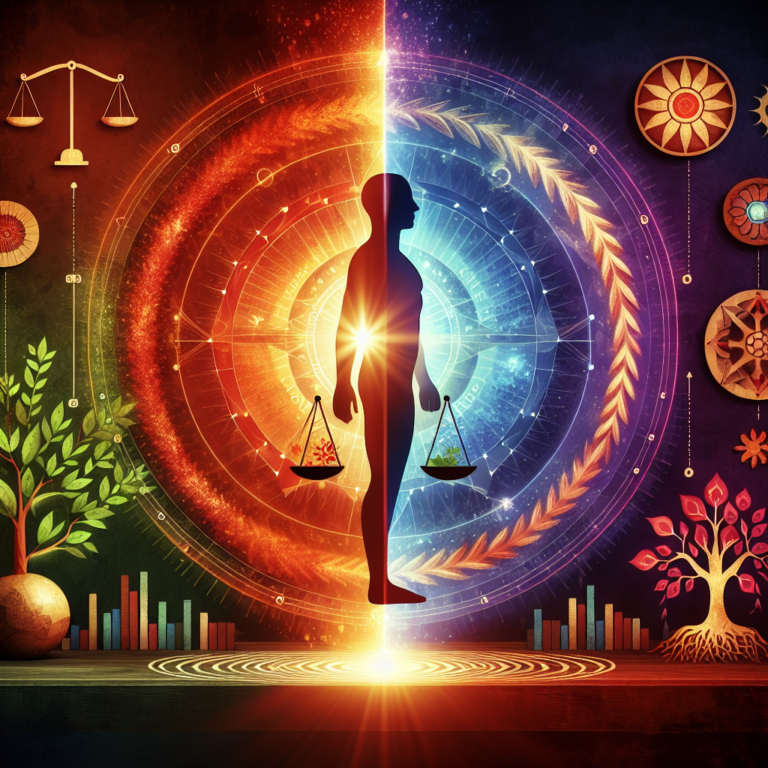Karma is a multifaceted concept that has intrigued countless individuals throughout history. Originating from Eastern philosophies, particularly Hinduism and Buddhism, karma embodies the principle of cause and effect, where every action has repercussions—whether positive or negative. However, beyond its philosophical origins, karma plays a significant role in personal growth, shaping our understanding of ourselves and our relationships with others.
Understanding Karma
At its core, karma reflects the idea that our actions lead to particular outcomes. These outcomes aren’t just confined to immediate results; they can ripple through time, affecting our future experiences and relationships. The basic tenets of karma can be summarized as follows:
- Actions Have Consequences: Every deed influences our life path, setting forth a cycle of reactions.
- Intent Matters: The motivation behind our actions is crucial; good intentions coupled with good actions yield positive karma.
- Learning and Growth: Karma serves as a tool for learning, guiding us toward personal evolution through the consequences we encounter.
Karma in Daily Life
In our daily lives, we constantly navigate a complex web of actions and reactions. Understanding karma can help individuals cultivate mindfulness and intentionality in their behaviors. This mindfulness can be pivotal for personal growth, as it encourages one to take responsibility for their actions instead of blaming external circumstances.
The Role of Self-Reflection
Self-reflection is a vital aspect of understanding how our karma unfolds in personal growth. It allows us to examine our actions, consider their implications, and learn from the outcome. By engaging in regular self-reflection, we enhance our awareness of how our behavior affects our lives and those of others.
Questions we might ask ourselves during self-reflection include:
- What actions have I taken recently that could impact my future?
- Am I acting out of love and compassion, or am I driven by fear and resentment?
- How do my actions align with my personal values and goals?
Karma and Relationships
The principle of karma extends beyond personal reflection; it also profoundly influences our relationships with others. Every interaction serves as an energetic exchange that contributes to the overall tapestry of our lives.
The Ripple Effect
The ripple effect of our actions can lead to unexpected outcomes in our relationships. When we engage positively, such as through kindness or support, it often leads to a return of that positive energy. Conversely, negative actions—like dishonesty or bitterness—can create a cycle of conflict and alienation.
Recognizing this ripple effect encourages us to forge healthier, more compassionate relationships, thereby promoting both personal and collective growth.
Cultivating Positive Karma
To harness the transformative power of karma for personal growth, it is essential to actively cultivate positive karma. Here are some practices that can help:
- Practice Mindfulness: Being present in the moment helps us make conscious choices rather than reacting impulsively.
- Engage in Altruistic Behavior: Acts of kindness and generosity can create positive ripples in our life and the lives of others.
- Set Intentions: Before undertaking significant actions, setting clear intentions can help align our actions with our personal growth goals.
- Forgiveness: Letting go of grudges and forgiving ourselves helps to free us from negative cycles of karma.
The Importance of Accountability
Accepting responsibility for our actions is a crucial aspect of embracing karma in our growth journey. Acknowledging our mistakes allows us to learn from them, fostering an environment ripe for personal development.
There are several steps to enhance our accountability:
- Admit Faults: Acknowledge when we have made wrong choices without making excuses.
- Seek Understanding: Try to understand how our actions affected others and what we can learn.
- Make Amends: When appropriate, take steps to rectify wrongs and rebuild trust.
Karma and Spiritual Growth
Many believe that understanding and working with karma significantly contributes to spiritual growth. This journey often leads to a more profound understanding of one’s purpose in life.
Spiritual Awakening Through Karma
Many people find that reflecting upon their karma leads to spiritual awakening. This alignment with one’s highest self often fosters greater compassion, understanding, and peace.
By observing the consequences of actions, individuals can uncover insights into their spiritual path and develop a deeper connection with their higher selves.
Living a Dharma-Aligned Life
Complementary to karma is the concept of dharma, which refers to our life’s purpose or duty. Aligning our actions with our dharma allows us to engage in activities that resonate with our true essence. When we live in accordance with our dharma, we naturally cultivate positive karma.
Real-Life Examples of Karma and Personal Growth
Many individuals have experienced transformative moments that illustrate the power of karma in personal growth. Consider the following scenarios:
Example 1: Professional Karma
Consider an individual who consistently undermines their colleagues for personal gain. Over time, as word spreads about their unethical behavior, they find themselves ostracized and unable to trust their peers. This scenario illustrates how negative actions once thought to yield short-term benefits ultimately lead to long-term consequences, serving as a catalyst for personal reflection and change. Conversely, an employee who generously shares knowledge and supports colleagues may find themselves surrounded by a positive work environment and ample opportunities for advancement.
Example 2: Personal Relationships
A person who habitually engages in negative communication within a relationship may find that constant conflicts lead to breakups or strained connections. As they reflect on their behavior and make a conscious effort to communicate more lovingly, they may witness profound changes not only in their relationships but also within themselves, leading to greater emotional intelligence and fulfillment.
Transformational Potential of Karma
The realization that our actions wield significant power can be both empowering and daunting. However, recognizing this potential allows us to step into a transformative journey of personal growth.
- Empowerment: Understanding karma enables us to take control of our lives by realizing that we are agents of change.
- Resilience: Facing and accepting the consequences of our actions fosters resilience and adaptability.
- Compassion: By acknowledging our flaws and understanding others’ actions, we cultivate empathy and compassion.
Building a Supportive Community
No journey of personal growth is undertaken alone. Building a supportive community can significantly amplify the positive effects of karma.
Surrounding ourselves with individuals who inspire, challenge, and support our growth can create an environment where positive karma flourishes. Engaging in group activities, volunteering, or participating in workshops focused on personal development further reinforces this communal growth.
Conclusion
In conclusion, the role of karma in personal growth is both profound and multifaceted. By acknowledging the implications of our actions and striving to cultivate positive karma, we can embark on a transformative journey toward self-discovery and fulfillment. Self-reflection, accountability, and alignment with our dharma are crucial in navigating this journey. As we learn from our past, embrace personal responsibility, and foster compassion within ourselves and our relationships, we create fertile ground for personal growth. Ultimately, understanding karma empowers us to shape our lives intentionally, transforming challenges into opportunities for development and enlightenment.
FAQs
What is karma?
Karma is the principle of cause and effect in which every action has consequences that affect an individual’s future experiences and relationships.
How can I cultivate positive karma?
You can cultivate positive karma by practicing mindfulness, engaging in altruistic behavior, setting clear intentions, and learning to forgive.
Does karma apply only to personal actions, or does it affect communities as well?
Karma operates on an individual level, but collective actions within communities can create a shared karmic experience that affects all members.
What is the relationship between karma and dharma?
Karma refers to the actions and their consequences, while dharma relates to one’s life purpose or duty. Aligning actions with dharma often leads to positive karma.
Can I change my karma?
Yes, individuals can change their karma by becoming aware of their actions and making intentional choices that promote positive outcomes.
Is karma the same in all cultures?
While karma has its roots in Eastern philosophies, similar concepts exist across different cultures, emphasizing the interconnectedness of actions and consequences.
Of course! What kind of prompt are you looking for? It could be for writing, brainstorming, art, or something else. Let me know your preferences!, #Role #Karma #Personal #Growth, #Role #Karma #Personal #Growth, 1736678710, the-role-of-karma-in-personal-growth





